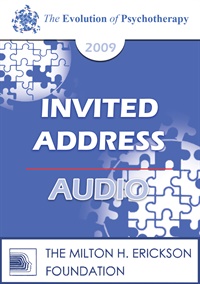
- Average Rating:
- Not yet rated
- Topic Areas:
- Invited Addresses | Storytelling | Psychotherapy
- Categories:
- Evolution of Psychotherapy | Evolution of Psychotherapy 2009
- Faculty:
- Cloe Madanes, HDL, LIC
- Duration:
- 52 Minutes
- Format:
- Audio Only
- Original Program Date:
- Dec 13, 2009
- Short Description:
- Cloé Madanes will present her view of what therapy should be by telling her favorite stories of people overcoming very serious challenges.
- Price:
- $15.00 - Base Price
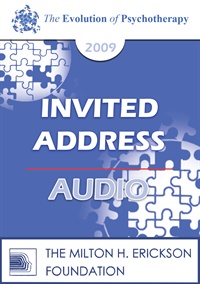
- Average Rating:
- Not yet rated
- Topic Areas:
- Invited Addresses | Attachment | Trauma | Psychotherapy
- Categories:
- Evolution of Psychotherapy | Evolution of Psychotherapy 2009
- Faculty:
- Bessel van der Kolk, MD
- Duration:
- 46 Minutes
- Format:
- Audio Only
- Original Program Date:
- Dec 13, 2009
- Short Description:
- The study of psychological trauma has been accompanied by an explosion of knowledge about how experience shapes the central nervous system and the formation of the self. The study of trauma has probably been the single most fertile area in developing a deeper understanding of the relationship among the emotional, cognitive, social, and biological forces that shape human development.
- Price:
- $15.00 - Base Price
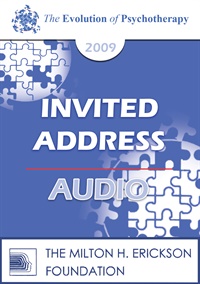
- Average Rating:
- Not yet rated
- Topic Areas:
- Invited Addresses | Psychology | Psychotherapy
- Categories:
- Evolution of Psychotherapy | Evolution of Psychotherapy 2009
- Faculty:
- Jean Houston, PhD
- Duration:
- 58 Minutes
- Format:
- Audio Only
- Original Program Date:
- Dec 13, 2009
- Short Description:
- Dr. Houston will offer ways and means to profoundly make a difference for the betterment of people, communities, organizations and cultures worldwide. Drawing on her work in over 100 countries in training leaders in human development in the light of social change, she will offer liberating thought ways, as well as techniques of activating human and social potentials in sensory, psychological, mythic and symbolic, as well as, spiritual and integral levels of the human capacity. Together, these lead to enhanced abilities to creatively and effectively deal with present challenges. Dr. Houston will address the unique place that present movements in psychology have to offer in a world of radical shifts.
- Price:
- $15.00 - Base Price
Tags: Psychology Psychotherapy
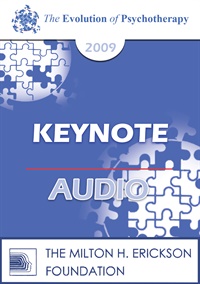
- Average Rating:
- Not yet rated
- Topic Areas:
- Cognitive Behavior Therapy (CBT) | Keynotes | Neuroscience | Psychotherapy
- Categories:
- Evolution of Psychotherapy | Evolution of Psychotherapy 2009
- Faculty:
- Aaron Beck, MD | Judith Beck, PhD
- Duration:
- 57 Minutes
- Format:
- Audio Only
- Original Program Date:
- Dec 10, 2009
- Short Description:
- In this keynote address, the following topics will be covered: the development of cognitive therapy; applications to other psychiatric and medical conditions; the relationship of brain abnormalities to symptoms; the use of neuroimaging and cognitive therapy; and predictions of the future for cognitive therapy, and psychotherapy in general.
- Price:
- $15.00 - Base Price
- Average Rating:
- Not yet rated
- Topic Areas:
- Family Therapy | Keynotes | Psychotherapy | History of Psychotherapy
- Categories:
- Evolution of Psychotherapy | Evolution of Psychotherapy 2009
- Faculty:
- Salvador Minuchin, MD
- Course Levels:
- Master Degree or Higher in Health-Related Field
- Duration:
- 1:12
- Format:
- Audio and Video
- Original Program Date:
- Dec 12, 2009
- Short Description:
- After a brief description of Family Therapy on the 1960s, and an equally brief description of where it is today, we will make a comparison of the success of family therapy in Europe and the shrinkage in the U.S. A new model of family assessment in four easy steps will be described.
- Price:
- $29.00 - Base Price
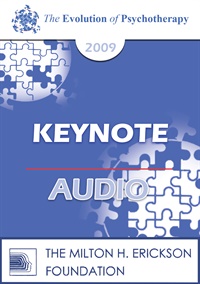
- Average Rating:
- Not yet rated
- Topic Areas:
- Keynotes | Aging and Mortality | Anxiety | Existential Therapy | Psychotherapy
- Categories:
- Evolution of Psychotherapy | Evolution of Psychotherapy 2009
- Faculty:
- Irvin Yalom, PhD
- Duration:
- 1 Hour 54 Minutes
- Format:
- Audio Only
- Original Program Date:
- Dec 12, 2009
- Short Description:
- The terror of death plays a larger role in our inner life and our psychological problems than is generally thought. Too often psychotherapists avoid inquiry into death anxiety; either because they do not know what they can offer patients or because they have not confronted their own anxiety about death. If we come to terms with mortality in our own personal therapy and familiarize ourselves with the topic, we can offer a great deal to patients terrorized by death. Individuals with much terror about death can be helped, not only to enjoy relief from fear, but also may find that an encounter with death will enhance their life. As wise men have pointed out through the millennia, death confrontation can awaken us to a fuller life.Awakening experiences, if we learn to recognize them, are amply available in everyday therapy. One important method of coping is to avoid large reservoirs of un-lived life.
- Price:
- $15.00 - Base Price
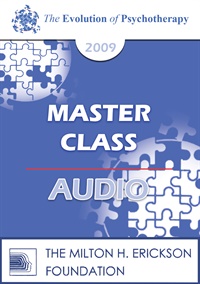
- Average Rating:
- Not yet rated
- Topic Areas:
- Brief Therapy | Experiential Therapy | Gestalt | Hypnosis | Psychotherapy | Ericksonian Hypnosis and Therapy Techniques | Hypnotherapy | Master Classes
- Categories:
- Evolution of Psychotherapy | Evolution of Psychotherapy 2009
- Faculty:
- Jeffrey Zeig, PhD | Erving Polster, PhD
- Duration:
- 2 Hours 49 Minutes
- Format:
- Audio Only
- Original Program Date:
- Dec 14, 2009
- Short Description:
- Gestalt therapy and Ericksonian hypnotherapy are experiential methods of change. In Combination they can be synergistic. Psychotherapy is best when clients have a first hand experience of an alive therapeutic process. Such dynamic empowering experiences pave the way for dynamic understandings. Drs. Polster and Zeig will engage with each other and the participants to examine commonalities and differences in their work.
- Price:
- $15.00 - Base Price
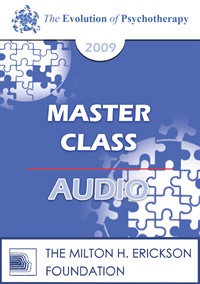
- Average Rating:
- Not yet rated
- Topic Areas:
- Brief Therapy | Experiential Therapy | Gestalt | Hypnosis | Ericksonian Hypnosis and Therapy Techniques | Hypnotherapy | Master Classes | Psychotherapy
- Categories:
- Evolution of Psychotherapy | Evolution of Psychotherapy 2009
- Faculty:
- Jeffrey Zeig, PhD | Erving Polster, PhD
- Duration:
- 2 Hours 42 Minutes
- Format:
- Audio Only
- Original Program Date:
- Dec 14, 2009
- Short Description:
- Gestalt therapy and Ericksonian hypnotherapy are experiential methods of change. In Combination they can be synergistic. Psychotherapy is best when clients have a first hand experience of an alive therapeutic process. Such dynamic empowering experiences pave the way for dynamic understandings. Drs. Polster and Zeig will engage with each other and the participants to examine commonalities and differences in their work.
- Price:
- $15.00 - Base Price
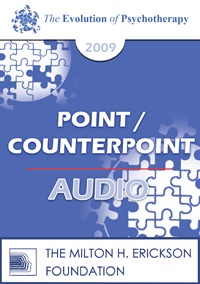
- Average Rating:
- Not yet rated
- Topic Areas:
- Point/Counterpoint Sessions | Psychotherapy | Therapist Development
- Categories:
- Evolution of Psychotherapy | Evolution of Psychotherapy 2009
- Faculty:
- Donald Meichenbaum, PhD
- Duration:
- 1 Hour 23 Minutes
- Format:
- Audio Only
- Original Program Date:
- Dec 09, 2009
- Short Description:
- A major challenge for any skills-oriented intervention is the issue of treatment generalization. Psychotherapists cannot just “train and hope” for transfer. In this presentation, Dr. Meichenbaum will discuss and demonstrate what needs to be done before, during and after interventions to make them more effective. He will discuss specific steps that psychotherapists should take to increase the likelihood of maintenance and generalization across settings and across response domains.
- Price:
- $15.00 - Base Price
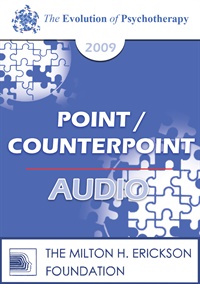
- Average Rating:
- Not yet rated
- Topic Areas:
- Point/Counterpoint Sessions | Trauma | Eye Movement Desensitization and Reprocessing (EMDR) | Psychotherapy
- Categories:
- Evolution of Psychotherapy | Evolution of Psychotherapy 2009
- Faculty:
- Francine Shapiro, PhD
- Duration:
- 1 Hour 8 Minutes
- Format:
- Audio Only
- Original Program Date:
- Dec 09, 2009
- Short Description:
- EMDR has been used worldwide over the past decade as an empirically validated trauma treatment. During that time, it has become clear that it is possible to simultaneously alleviate suffering, help stop the cycle of violence, and address the devastating effects of trans-generational transmission. The clinical implications for simple symptom reduction versus personal growth and resiliency will be explored.
- Price:
- $15.00 - Base Price
Please wait ...


